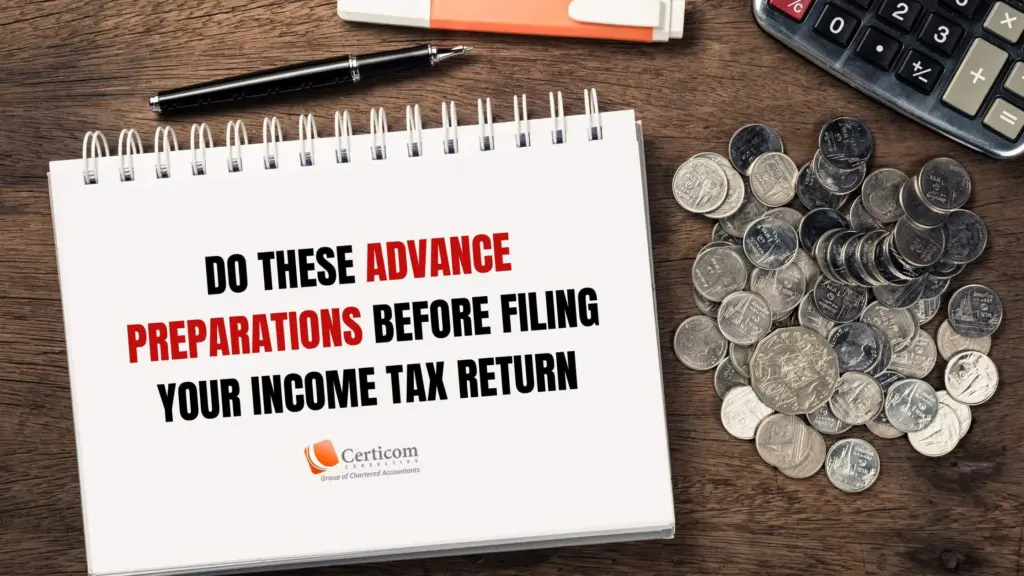Do these advance preparations before filing your income tax return

Course of action for salaried
The employers are required to furnish form no. 16, which contains particulars of your salaries and tax deducted, by 15th June, 2023. So by now, the majority of salaried taxpayers would have received their Form No. 16. Those who have yet to receive it, need to follow it up with their employer.
After you have received Form 16, it is important for you to scrutinize the details mentioned in it thoroughly so as to ensure that all the exempt allowances are properly shown. Such allowances mainly include House Rent Allowance (HRA) and Leave Travel Assistance (LTA). Additionally, you also need to verify that the various deductions available under Chapter VIA for items of investments & expenditures have been considered by your employer while arriving at your taxable salary and documents in respect of which you have submitted to ensure that the supporting documents.
This may be some errors/omissions due to delay in submission of the relevant proof on your part or due to oversight of the finance department. The deductions relate to various items like life insurance premiums, health insurance premiums, home loan repayment, interest on education loans or school fees etc.
In case these items are not properly mentioned in Form 16, you need to bring them to the notice of your employer for corrective action, you also need to bring it to the notice of your tax consultant so that a proper claim for such omitted deductions is made while filing the ITR. Please also verify that the amount of gross salary is correctly shown in form no. 16 as per the salary slips received or the amount credited in your bank account after accounting for various deductions like PF, Profession tax and income tax, etc.

If you are engaged in business or a profession
In case you are engaged in business or profession, please verify whether you are eligible to opt for a presumptive taxation scheme based on gross receipts or turnover. In case the turnover exceeds the prescribed limits, you need to get books of accounts audited and will have to prepare for the audit as well. The audit report needs to be uploaded o the tax department website. In case your receipts/income are subject to tax deduction at source, you should prepare a reconciliation of the number of invoices and payments received with TDS.
Please download your form No. 26AS and Annual Information Statement(AIS) from the income tax website and verify that the amount of TDS as per your books of accounts is duly reflected in these statements. Seek clarification from your client/customer in case there is a variation between these two sets of records.
If you are engaged in business or a profession
In case you are engaged in business or profession, please verify whether you are eligible to opt for a presumptive taxation scheme based on gross receipts or turnover. In case the turnover exceeds the prescribed limits, you need to get books of accounts audited and will have to prepare for the audit as well. The audit report needs to be uploaded o the tax department website. In case your receipts/income are subject to tax deduction at source, you should prepare a reconciliation of the number of invoices and payments received with TDS.
Please download your form No. 26AS and Annual Information Statement(AIS) from the income tax website and verify that the amount of TDS as per your books of accounts is duly reflected in these statements. Seek clarification from your client/customer in case there is a variation between these two sets of records.
The discrepancy may arise due to reasons like an accounting of invoices in different accounting years, non-receipt of the invoices, or non-deposit of tax deducted by deductors to the government. In case you are following the cash basis of accounting you have to identify the tax deduction which you need to carry forwards to subsequent year in case you have not received the payment during the year.
In case you have transacted in shares and mutual funds
Those who invest in mutual fund investors, should get a detailed statement of the transactions done during the year. Some of these transactions like those done under a Systematic Transfer Plan (STP) and switch within the same fund house will not reflect in your bank account and thus may go unreported. In case you are investing in shares through a broker please get a detailed statement for all transactions for the year.
Verify that all the transactions appearing in the statement are properly accounted for in your income computation. You need to be careful, particularly for intra-day transactions where some shares have been bought against shares sold on the same day which is not reflected in your bank statement.

In respect of Interest income
For those who derive interest income from fixed deposits with banks should obtain interest certificates for the whole year to ensure that all the interest income including the accrued interest is taken into account while filing the ITR. In case of cumulative deposits, ensure that the interest accrued during the year is properly included in your income. In case you follow the cash basis of accounting, ensure that full interest in respect of fixed deposits matured during the year is included in your income even if the same has been renewed.
Verification of transactions with form No. 26AS and AIS
Please download the latest form No. 26AS and AIS to verify and ensure that all the interest shown is being offered for tax as well as to ensure that full tax credit for TDS as per your books is available here.
Read More: HOW TO MAXIMIZE YOUR TAX SAVINGS ON HOME LOAN PRINCIPAL REPAYMENTS
AIS has the details of various financial transactions entered into by you during the year. Ensure that income in respect of all those transactions has been considered in your ITR.
Related Post
Top 7 Income Tax Errors That Invite IT Notices
Resident’s Guide to Buying NRI Property in India
Book A One To One Consultation Now For FREE
How can we help? *



